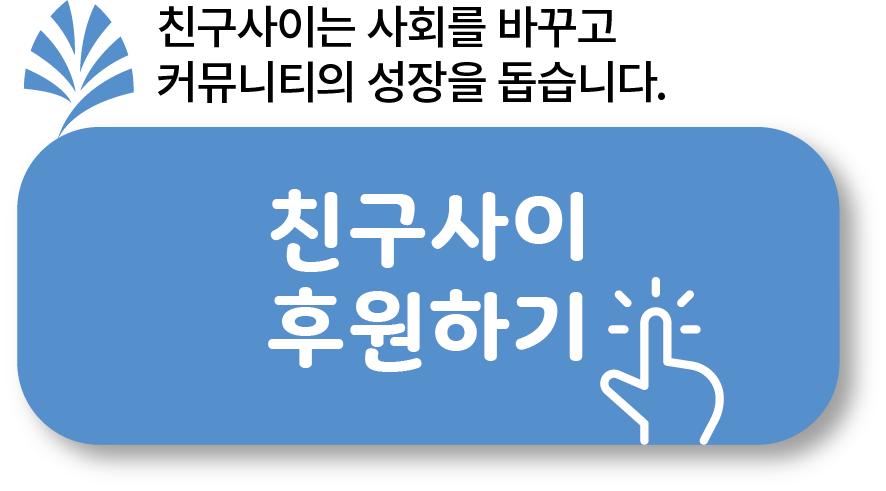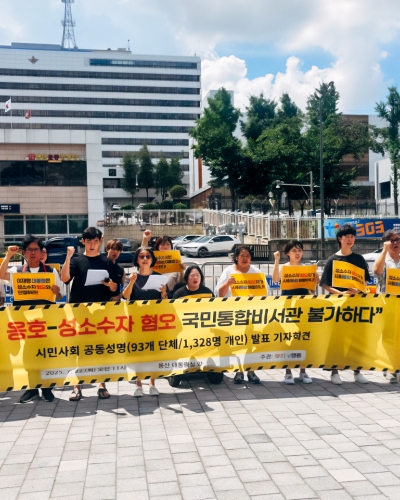| 기간 | 5월 |
|---|
[활동스케치 #4]
미국 콜로라도대학교 덴버캠퍼스 정치학과 종로3가 답사
2024년 5월 26일 정오, 미국 콜로라도대학교 덴버캠퍼스 정치학과 토니 로빈슨(Tony Robinson), 지민선 교수와 소속 학과 학생들이 종로3가를 방문하여, 한국 게이커뮤니티의 역사가 서린 주요 장소를 답사하는 일정을 가졌습니다. 답사 인솔은 친구사이 사무국장과 소식지팀장께서 진행해주셨고, 통역은 지민선 교수께서 수고해주셨습니다. 당일 배부된 국·영문 답사지의 전문을 친구사이 소식지에 공유드립니다. 관심있는 분들의 일독을 권해드립니다.
| * 이 글은 다음 두 글의 내용을 발췌·수정·증보한 것입니다. - 김대현, 「종로3가 게이 게토와 게이커뮤니티의 위치」, 『친구사이 소식지』 99, 한국게이인권운동단체 친구사이, 2019.9. - 김대현, 「종로3가 게이 게토의 역사와 게이커뮤니티의 형성」, 『선게이서울 : 지보이스 스토리북 창단 17주년 특별판』, 한국게이인권운동단체 친구사이, 2019. |
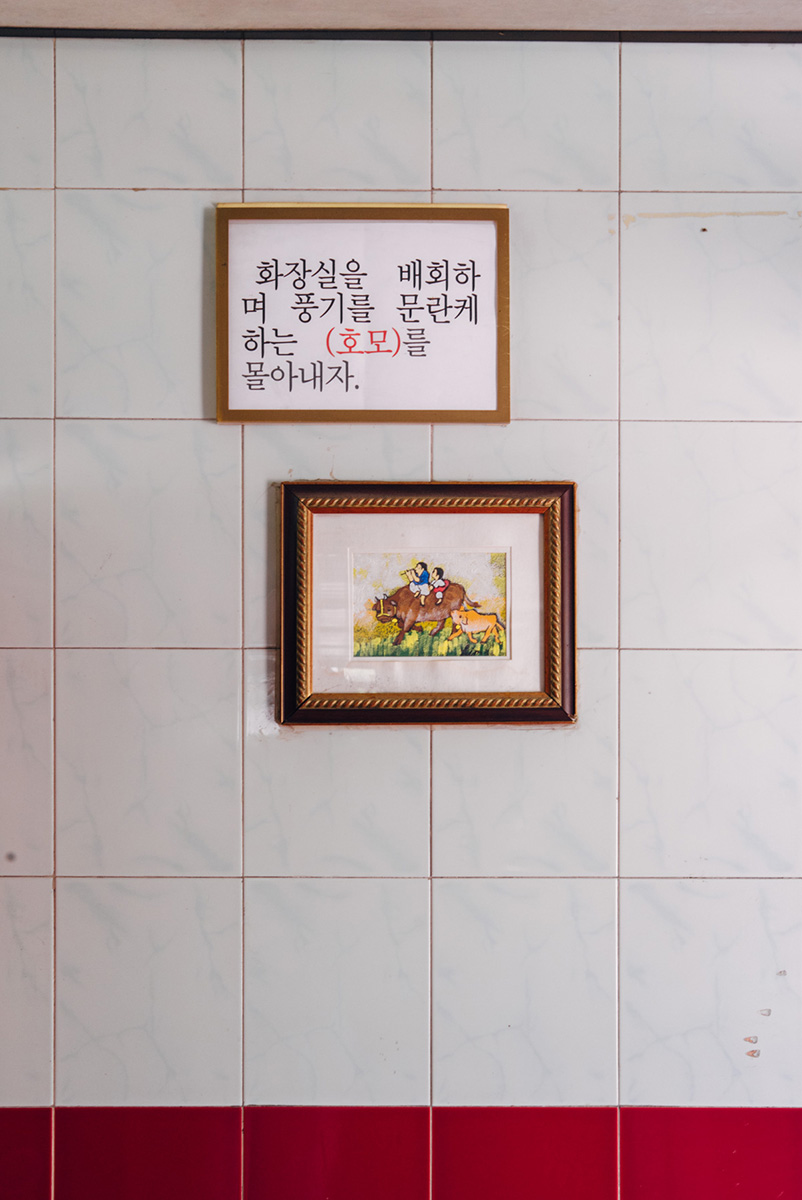
▲ 2012.7.12. @탑골공원 화장실
종로3가 게이커뮤니티의 역사
김대현 (한국게이인권운동단체 친구사이 운영위원, 역사문제연구소 연구위원)
1. 탑골공원
탑골공원은 1897년 한국인이 세운 최초의 근대식 공원이다. 공원의 이름은 경내에 있는 국보 제2호로 지정된 원각사지 10층 석탑에서 유래한다. 1910년 일제에 의해 대한제국이 망한 후 1919년 일제에 대한 민족적 저항인 3.1운동이 일어났을 때, 이곳 탑골공원에서 기미독립선언서가 낭독되었다. 대한민국 정부 수립 이후 1960년 4.19혁명이 일어났을 때, 탑골공원에 세워졌던 이승만 대통령의 동상은 그가 하야한 4월 26일 철거되었다. 이처럼 탑골공원은 한국 근현대사를 통틀어 민족적 정체성을 상징하는 공간으로 자리잡았다.
한편 이곳 근방은 오늘날의 게이·트랜스젠더 여성에 해당되는 비규범적 젠더·섹슈얼리티 실천을 수행한 사람들이 모여든 공간이기도 했다. 그들은 스스로를 종종 일제 강점기 유명한 친일파 여성이었던 배정자에 비유하였는데, 이는 자신들을 민족의 규범적 주체로부터 벗어난 존재로 감각하였음을 드러낸다.[1] 과거의 성소수자들은 이곳 탑골공원의 탑 주변을 맴돌면서 하룻밤 섹스 상대를 찾고는 하였는데, 이를 일컬어 ‘탑돌이’라 불렀다. 이러한 행동은 이곳에 함께 존재했던 거리 성매매여성의 그것을 본딴 것이다. 실제로 이곳 일대의 종로3가 지역은 서울시내의 유명한 성매매집결지이였다. 이곳에서 과거 게이·트랜스젠더 여성과 성매매여성은 서로 비슷한 형태의 사회적 낙인을 공유했다. 즉 정상가족 내에서 섹스를 영위할 것 같지 않은 비규범적 존재에 대한 낙인이었다.
게이·트랜스젠더 여성이 자신을 가리키는 비어 가운데 하나로 ‘보갈’이라는 말이 있다. 이 말은 성매매여성을 가리키는 비칭인 ‘갈보’를 뒤집은 것이다. 이 두 단어의 유사성은 앞에서 보았듯이 우연이 아니다. 한국의 게이들은 지금도 게이바에 앉아 “나 오늘 안팔렸어”라는 말을 사용하기도 한다. 이 말은 자신을 은연중 성매매여성에 비유하는 의미를 담고 있다. 이런 말을 쓰는 이성애자 남성을 거의 찾아볼 수 없다는 점에서, 이런 말들은 그 자체로 이성애와 비이성애 사이의 구조적 차이를 드러냄과 동시에, 게이·트랜스젠더가 성매매여성과 은유적으로 유사한 형태의 비규범적 여성성을 수행해온 이들임을 드러낸다.[2] 이러한 맥락을 잘 드러내주는 한국영화로 이재용 감독의 <죽여주는 여자>(2016)가 있다.
1990년대에 접어들면서 한국에도 성소수자인권운동이 가시화되었다. 성소수자인권운동 단체들이 최초로 그들 단독으로 시위를 벌인 장소가 바로 이 탑골공원 정문 앞이다. 교과서에 삽입된 동성애 혐오 표현에 문제제기한 이 집회는 1997년 6월 28일 열렸다. 국정교과서가 있던 시절, “에이즈, 동성연애, 매춘, 성폭행, 마약, 음란비디오, 저질만화 등이 늘어나면서 성도덕의 문란이 사회문제가 되고 있다”는 고등학교 윤리 교과서, “동성연애”와 “에이즈”를 직결시키는 고등학교 교련 교과서, 나아가 서울시교육청에서 발간한 ‘성과 행복’ 교과서의 “매매춘이나 동성간의 성관계와 같은 불건전한 성문화” 등의 표현에 항의한 집회였다. 1994년 발족한 남성동성애자인권운동단체 친구사이를 비롯한 운동단체들은 “동성애자 차별적 교과서를 개정하라”는 플래카드를 걸고, 촛불을 든 채 행진을 진행하였다.[3]
2. 파고다극장
탑골공원의 이름을 딴 파고다극장은 1960년 이곳에 세워졌다. 시간이 흘러 1970년대로 접어들면서 이곳은 낙후된 시설을 가진 동시상영관이 되었고, 오늘날의 게이·트랜스젠더 여성에 해당하는 사람들이 몰려들어 섹스 파트너를 찾고 섹스를 수행하는 공간으로 거듭났다. 파고다극장은 1970년대 이후 종로3가의 게이업소 인프라를 만드는 데 구심점의 역할을 했으며, 당대 대중오락잡지에서 ‘P극장’, ‘P싸롱’으로 불리면서 비규범적 젠더·섹슈얼리티를 수행하는 당사자들의 거점으로 암암리에 회자되었다. 이곳은 2002년 마침내 폐관되었다.[4] 이러한 공간의 역사를 잘 드러내주는 한국영화로 홍민키 감독의 <낙원>(2023)이 있다.
이곳에서의 섹스는 때때로 경찰의 단속에 내몰리기도 했지만, 때로는 경찰의 비호 아래 수행되기도 했다. 이곳뿐 아니라 군사독재 시절 종로3가의 유흥업소들은 대개 경찰이나 조직폭력배의 사적인 비호와 결탁 아래 자신들의 영업을 이어나가고는 했다.[5]
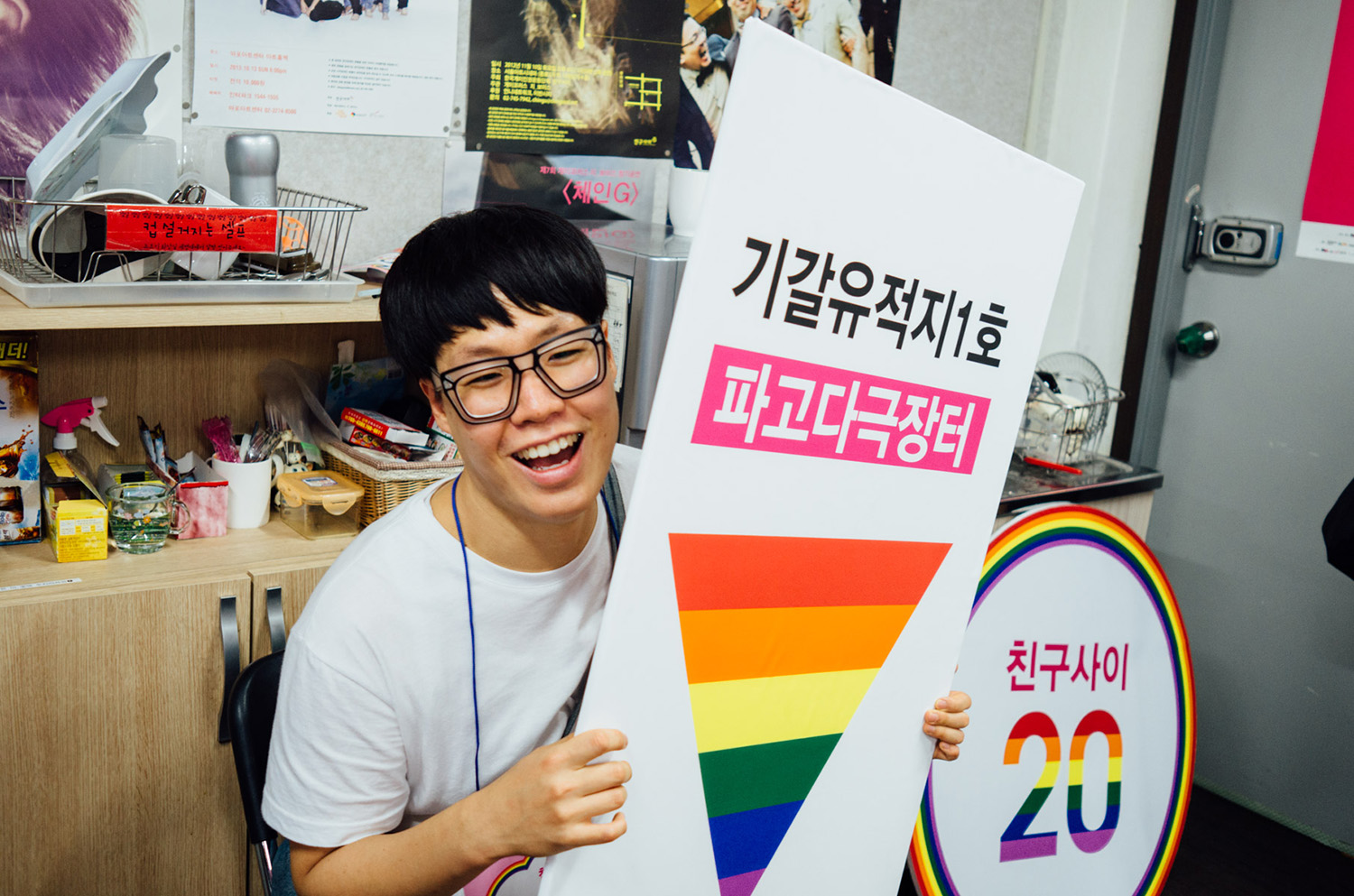
▲ 2014.8.30. @친구사이 사무실
3. 낙원상가
낙원상가는 한국 최대의 악기 전문상가이다. 1967년 낙원상가 건물과 더불어 탑골공원 주변에 파고다 아케이드가 세워졌는데, 악기 전문점들이 파고다 아케이드에 입점하기 시작했다. 그러다 1979년 파고다 아케이드가 철거 결정되면서 그곳의 점포들이 1980년대부터 낙원상가로 이주해 오늘에 이른다.
이곳에 악기 전문상가가 성업한 이유는, 당대 유흥업소에서 흥을 돋우던 서비스 노동자들이 주로 밴드 연주자들이었기 때문이다. 실제로 유흥업소는 한국 KPOP이 성장한 산실과도 같은 곳이었고, 그 중 대표적인 것이 미8군의 R&R(Rest & Recreation), 즉 ‘위안’무대였다. 1950년대부터 미군 부대 주변은 미군을 대상으로 한 유흥업소가 성업했고, 이 곳의 무대에는 연습을 거친 전문 연주자와 가수, 댄서들이 올랐는데, 이 때 이들을 훈련하던 업체들은 오늘날 KPOP 연예기획사 및 연습생 시스템의 원류와 같다.[6] 이 당시의 풍경을 잘 그려낸 한국의 다큐멘터리로 김대현 감독의 <다방의 푸른 꿈>(2015)이 있다.
당시 ‘위안’무대에 섰고 쎄시봉, 청개구리의 집 등 대중음악감상실에서 활동하던 통기타 가수들을 대상으로 공연기획자을 한 이백천은 당시의 상황을 다음과 같이 회고했다. “미군 위문 연주로 제 집 식구도 위문 못하면서 남군 북군이 섞인 미군 병사들을 그들의 음악으로 달랬다.”[7] 한국을 둘러싼 초국적 성매매 네트워크는 지금도 작동 중이다. 현재는 동남아시아 지역의 성매매여성들이 ‘연예인 비자(E-6)’를 받고 한국 유흥업소에 유입되는 사례가 늘고 있다. 이를 다룬 한국 다큐멘터리로 이고운 감독의 <호스트네이션>(2016)이 있다.
4. 프렌즈
낙원상가와 게이업소와의 관계는 또 있다. 1980년대 이후 유흥업소의 대세가 밴드에서 가라오케로 바뀌면서, 유흥업소를 채우던 연주자의 자리가 좁아지기 시작했고, 따라서 이곳 일대의 악기 창고가 비게 되었다. 악기 창고는 대체로 월세가 저렴했고, 용도를 잃은 악기 창고 자리에 속속 게이업소들이 들어서기 시작했다. 그곳들은 주로 지하에 위치해있었고, 손님들이 어떤 사람들인지 들키고 싶지 않았던 업소의 입장에서는 최적의 장소였다.[8] 더구나 한국은 1999년까지 자정 이후 심야영업이 불법이었고,[9] 그랬기에 게이업소를 포함한 한국의 유흥업소들은 대개 자정 이후 문을 걸어잠그고 불법으로 영업을 이어나갔다.
게이업소인 프렌즈는 2003년 개업하였고, 2004년 이곳에 자리잡아 오늘에 이른다. 프렌즈가 독특한 게이업소인 이유는, 당시 종로3가 게이바 중 최초로 1층에 자리잡았고, 무지개 깃발을 내걸었다는 데 있다. 1층에서의 영업과 무지개 깃발을 내거는 것에 대해, 개업 당시 이곳을 찾은 손님들의 많은 만류가 있었다. 게이업소가 내부가 보이는 통유리를 지닌 채 지상으로 올라오기까지는 그러한 우여곡절이 있었다. 더불어 한국의 상업문화와 관련 법제 특성상 한 업장이 권리금 차익을 노려 자리를 옮기지 않고 한 곳을 오래 지키는 일은 몹시 드문 일이다. 게이업소를 단순히 이윤 추구의 상업 공간으로만 볼 수 없는 까닭이 여기에 있다.[10]
5. 오진암
현재의 이비스 앰배서더 서울 인사동 호텔 자리는, 1953년부터 영업했던 오진암이 있던 곳이다. 한복 입은 기생들이 정말로 술을 따르는 요정이었던 오진암(梧珍庵)은, 1960~70년대 박정희 정권기 막후 정치의 현장으로 기능했고, 1972년 방남한 북측 인사와 함께 7.4남북공동성명의 초안을 성안한 곳이기도 하다. 이곳 외에도 종로3가에는 몇몇 유명 요정들이 성업했는데, 1965년 한일국교정상화 이후 늘어난 일본인 관광객들에 의해 이 업소들은 소위 ‘기생관광’의 호조를 누렸다. 이곳에 있던 건물들 중 일부는 현재 종로구 부암동의 안평대군 생가로 홍보되는 무계원(武溪園)으로 옮겨갔다.
이곳 요정들에는 기생들이 기예를 펼치는 ‘무대’가 존재했다. 한국의 유흥업 법제에서 무대 설치가 허용된 업소들은 그야말로 ‘유흥주점’인 1종 업소들 뿐이다. 이 법정 유흥업소는 유흥접객원을 합법적으로 고용할 수 있는 룸살롱과 나이트클럽을 일컬으며, 그 외의 2종 단란주점, 3종 노래연습장에서는 무대 설치가 자유롭지 못하다. 이렇게 무대와 가무를 기준으로 유흥업소의 등급을 엄격하게 구분하는 전통은 1908년으로 거슬러 올라간다. 그해에 제정된 「기생단속령」과 「창기단속령」은 ‘예기(藝妓)’가 무대에 서는 “1종요리점”과 전업 성매매에 종사하는 ‘창기(娼妓)’를 고용하는 “2종요리점”을 서로 분리하였다.[11] 음주가무와 성매매를 구분하고자 했던 것은 조선총독부와 기생조합 양쪽 모두의 욕망이었지만, 슬프게도 그 둘은 종종 분리되지 못했다.
해방이 되어 일제 시기의 공창제는 폐지되었으나, 그 때 폐지된 것은 ‘창기’였을 뿐, ‘예기’와 관련된 규정은 이후 식품위생법의 ‘접객부’ 조항으로 현재까지 법조문에 살아남아있다. 그리고 법제상의 ‘접객부’와 성매매 역시, 슬프게도 종종 분리되지 못했다.[12] ‘무대’와 ‘딴따라’에 얽힌 백년에 걸친 오욕의 역사가 이러하였다.
6. 홀, 심
종로구 익선동 93에는 현재 게이업소인 가라오케 ‘홀’이 영업 중이다. 실내에서 담배를 필 수 있는 것에서 단란주점 허가가 있음을 미루어 짐작할 수 있다. 이 곳은 1983년 서울종로경찰서에 의해 이곳에서 일하던 여장남자들이 체포되어 즉결심판에 넘겨진 곳이기도 하다. 경범죄처벌법 위반으로 체포된 여장남자뿐 아니라, 당대의 성매매여성들 또한 경찰에 의해 체포되어 즉결심판에 넘겨졌고, 최장 29일간 구류를 살았다.[13]
이는 한국의 퀴어 관련 단속의 특징을 보여주는 것인데, 일반 형법에서 게이/퀴어를 금지했던 미국의 소도미법과 이를 계수한 한국의 군형법과는 달리, 한국은 주로 경범죄처벌법 등 ‘풍기문란’을 근거로 퀴어, 성매매여성을 비롯한 사회적 소수자들을 처벌했다.[14] 게이업소에 들이닥쳐 유독 여장남자만을 체포해간 것 역시, 심야영업 단속이 아닌 이상 성별 비순응 코드가 상대적으로 드러나지 않는 게이 손님의 경우 체포할 명분이 부족했기 때문이다.
1974년에는 창덕궁 앞 권농동에 이 지역 최초의 게이바 「심」이 개업하였다.[15] 1965년 한일국교정상화 이후 한국에 몰려든 일본인 관광객들 중, 게이·트랜스젠더 여성의 스펙트럼에 있던 일본인이 돈을 댄 가게였다. 이어서 1978년 「갈등」, 1979년 「갈(渴)」이 각각 개업하였다.[16] 「심」의 경우 나이가 지긋한 일본인 게이가 오면 젊은 한국 게이들이 시중을 들게 했는데,[17] 이는 성매매여성을 대상으로 한 ‘기생관광’을 연상케 한다.[18] 제국의 성매수자와 탈식민 저개발국의 성산업의 연결고리는 끈끈했고, 그 지근거리에 퀴어들의 거처가 있었다.
한국 클럽문화의 대세가 미군 R&R의 국내 유치를 통한 외화벌이가 목적이던 호텔 지하 나이트클럽에서 1990년대 홍대 인디 클럽으로 바뀌면서(두 클럽은 관장 법령이 서로 다르다), 비로소 그곳에서의 유흥문화는 같은 장소에서 실제로 수행되고 알선되는 성매매의 손아귀에서 상대적으로 벗어날 수 있었다.[19] 비슷한 시기 게이업소들 또한, 그곳에서 ‘팔린다’는 말이 실제 성매매에서 은유의 성매매로 그 뜻이 옮겨지기까지는 적지 않은 시간이 걸렸다. 유흥문화 안에서 성적 합의의 문화를 만들고, 음란함과 난잡함과 쾌락의 규범 및 비규범을 남이 아닌 ‘우리’의 입장에서 다시 정의하는 노력들이 바로 이곳에서 이루어졌다.
7. 돈광과 친구사이 사무실
돈의동 쪽방촌은 가난한 사람들이 모여사는 곳이다. 이곳의 공간 중 일부에 과거 동성애자 남성들이 모여 섹스를 하는 ‘돈광’이 있었다.[20] 이성애자의 공간이 그곳을 드나드는 동성애자에 의해 동성애적 공간으로 거듭나는 것은 으레 있는 일이다. 그 중 대표적인 예가 1990년대에 출현한 게이 사우나, 즉 ‘찜방’이었다.[21]
그런 업소들이 모여있는 곳에 한국게이인권운동단체 친구사이의 사무실이 있다. 친구사이는 1994년 설립되었고, 1998년 이곳 종로3가로 사무실을 이전했으며, 2006년 현재의 이곳에 자리잡았다. 친구사이가 종로3가에 사무실을 둔 이유는, 게이커뮤니티를 대상으로 활동하는 단체는 모름지기 기존의 게이들이 존재하는 곳에 있는 편이 합당하다는 판단에서였다.
친구사이는 기존에 존재하는 게이커뮤니티 외에, 앞으로 만들어가야 할 게이커뮤니티에도 관심을 기울인다.[22] 친구사이 사무실은 친구사이가 연대하는 많은 단체들의 회의가 수시로 열리는 곳이다. 친구사이를 비롯한 한국의 성소수자인권운동은 한국의 노동운동, 인권운동, 여성운동, 장애운동과 긴밀히 연대해왔다. 이러한 역사를 드러내는 한국의 영화로는 이동하 감독의 <위켄즈>(2016)를 들 수 있다.
가령 2022년 5~6월 차별금지법 제정을 촉구하는 차별금지법제정연대의 활동 가운데, 수십일 동안 곡기를 끊은 차별금지법제정연대 소속 활동가 두 명 중 한 명이 바로 친구사이에 소속된 게이 활동가였다.[23] 이것은 한국 게이인권운동과 게이커뮤니티의 역사와 위상을 말해주는 기념비적인 사건 가운데 하나라 할 수 있다.
2020년 5월 이태원 코로나 팬데믹 사태 때, 친구사이 연대단체 중 한 곳인 ‘성적권리와 재생산정의를 우한 센터 셰어’의 활동가 나영은 5월 29일 기자회견을 통해 다음과 같이 발언했다. 이것이 가능했던 이유는 게이와 다른 그룹들이 서로 정체성은 다를지언정, 한국 사회 운동의 여러 현장들을 통해 만나고 서로를 식별하고, 거기에 함께 있으면서 공동의 운동적 과제를 쟁취하기 위해 싸운 경험이 있기 때문이다. ‘거기에-함께-있었음’의 기억은 때로 정체성 정치보다 힘이 세다. 친구사이는 그 사실을 이제껏 잊어본 적이 없다.[24]
|
"[찜방 관련 기사에 대해]워낙 평생을 이성 간의 성관계에 관한 폭력적이고 자극적인 소식들에 둘러싸여 살아서 그런지 도대체 어느 부분이 그렇게 놀랍고 자극적인지 알 수가 없더라고요. 오히려 “맘에 들면 건드려 보고 반응이 있으면 관계를 하고, 거부하면 다른 방으로 간다”는 부분은 동의 여부를 확인하니 다행이다 싶고, “복도 한쪽에는 휴게실이 마련돼 있었다. TV, 음료수 자판기, 재떨이 등이 있는 평범한 휴게실로 보였다. 입구 옆에 놓인 콘돔과 젤이 한가득 담긴 바구니를 발견하기 전까지는 그랬다.” 부분은 성건강을 지킬 용품을 잘 구비해 놓았다니 다행이다 싶었습니다. 콘돔과 젤이 한가득 담긴 바구니라니, 얼마나 소중한가요.
|
[1] 김대현, 「1980~90년대 게이 하위문화와 대안가족의 구성 : 제도적 이성애와의 관계를 중심으로」, 『구술사연구』 12(1), 한국구술사학회, 2021, 75~76쪽.
[2] 김대현, 「게이와 페미니즘」, 『문화/과학』 104, 문화과학사, 2020, 144~149쪽.
[3] 「집단적 커밍아웃 시작되다!」, 『친구사이 소식지』 1997.8 ; 「핫이슈 : 동성애 비하 고교 교과서 | 자살을 방조하는 교과서를 뒤집어라」, 『BUDDY』 16, 1999.9.1., 34쪽 ; 루인·한채윤, 『퀴어 한국사 : 1일 1페이지 쿠어한 역사 읽기』, 이매진, 2025, 133쪽.
[4] 「퀴어영화제 ‘파고다극장의 유언’ 13일 개막」, 『씨네21』 2003.3.5.
[5] 김대현, 「1980~90년대 게이 하위문화와 대안가족의 구성 : 제도적 이성애와의 관계를 중심으로」, 『구술사연구』 12(1), 한국구술사학회, 2021, 79~80쪽.
[6] 김대현, 「워커힐의 ‘디바’에게 무대란 어떤 곳이었을까 : 1960~70년대 유흥업과 냉전시대의 성문화」, 오혜진 기획, 『원본 없는 판타지 : 페미니스트 시각으로 읽는 한국 현대문화사』, 후마니타스, 2020, 134~139쪽.
[7] 이백천, 『이백천의 음악여행』, 나미북스, 2014, 10쪽.
[8] 「「전설의 명인을 찾아서」 인터뷰록 원본」, 『선게이서울 : 지보이스 스토리북 창단 17주년 특별판』, 한국게이인권운동단체 친구사이, 2019, 76~77쪽.
[9] 「이건 이렇게 : 심야영업 제한 폐지」, 『경향신문』 1998.9.24, 7면.
[10] 김대현·이유나, 「게이 남성 관계・돌봄 실천의 조건 : 첫 세대 비(이성애)혼 게이커뮤니티의 명암」, 『가족과 커뮤니티』 10, 전남대학교 인문학연구원, 2024, 57~58쪽.
[11] 이정노, 「일제강점기 서울지역 기생의 요리점 활동과 춤 연행 양성 연구」, 『한국문화연구』 29, 이화여대 한국문화연구원, 2015, 114쪽.
[12] 박정미, 『한국 성매매정책에 관한 연구 : ‘묵인-관리 체제’의 변동과 성판매여성의 역사적 구성, 1945~2005년』, 서울대 사회학과 박사학위논문, 2011, 80~88쪽.
[13] 김대현, 「1950~60년대 ‘요보호’의 재구성과 ‘윤락여성선도사업’의 전개」, 『사회와 역사』 129, 한국사회사학회, 2021, 12~19쪽.
[14] 허윤, 「1950년대 퀴어 장과 법적 규제의 접속 : 병역법, 경범법을 통한 섹슈얼리티의 통제」, 『법과 사회』 51, 법과사회이론학회, 2016 참조.
[15] 「역사 속의 진실 : 이것이 한국 최초의 이반업소였다!」, 『보릿자루』 25, 보릿자루 편집부, 2001.2.29, 36쪽.
[16] 「종로는 뿌리가 있어! : 게이 바 ‘돈키호테’ 심대철 사장님에게서 듣는 80년대 종로 이야기」, 『BUDDY』 22, 도서출판 해울, 2003.3.19, 71쪽.
[17] 「역사 속의 진실 : 이것이 한국 최초의 이반업소였다!」, 『보릿자루』 25, 보릿자루 편집부, 2001.2.29, 37쪽.
[18] 권창규, 「산업으로서의 관광 속 관광기생의 존재 : 1970, 80년대 한국의 섹스관광(‘기생관광’) 산업」, 『대중서사연구』 21(2), 대중서사학회, 2015 참조.
[19] 김대현, 「명월관의 기생들은 어디로 갔을까」, 『세상과 은둔 사이 : 벽장 안팎에서 쓴 글들』, 오월의봄, 2021 참조.
[20] 김경민, 『겨울 허수아비도 사는 일에는 연습이 필요하다』, 도서출판 성림, 1993, 117쪽.
[21] 조성배, 「게이 남성의 소비 공간과 몸의 정치학」, 연세대학교 문화학협동과정 석사학위논문, 2003, 4장 참조.
[22] 「게이커뮤니티 운동 약사, 1995~2000」, 『친구사이 소식지』 66, 한국게이인권운동단체 친구사이, 2015.12.
[23] 「차별금지법 제정 쟁취를 위한 46일 농성&단식투쟁 마무리 집회」, 『친구사이 소식지』 143, 한국게이인권운동단체 친구사이, 2022.5.
[24] 로지 브라이도티, 윤조원·이현재·박미선 옮김, 『포스트휴먼 페미니즘 : 더 나은 미래를 위한 변혁의 힘』, 아카넷, 2024[2021], 26, 178쪽.
[25] 「코로나19 이태원 클럽 집단감염 관련 성명·논평 일람」, 『친구사이 소식지』 119, 한국게이인권운동단체 친구사이, 2020.5.
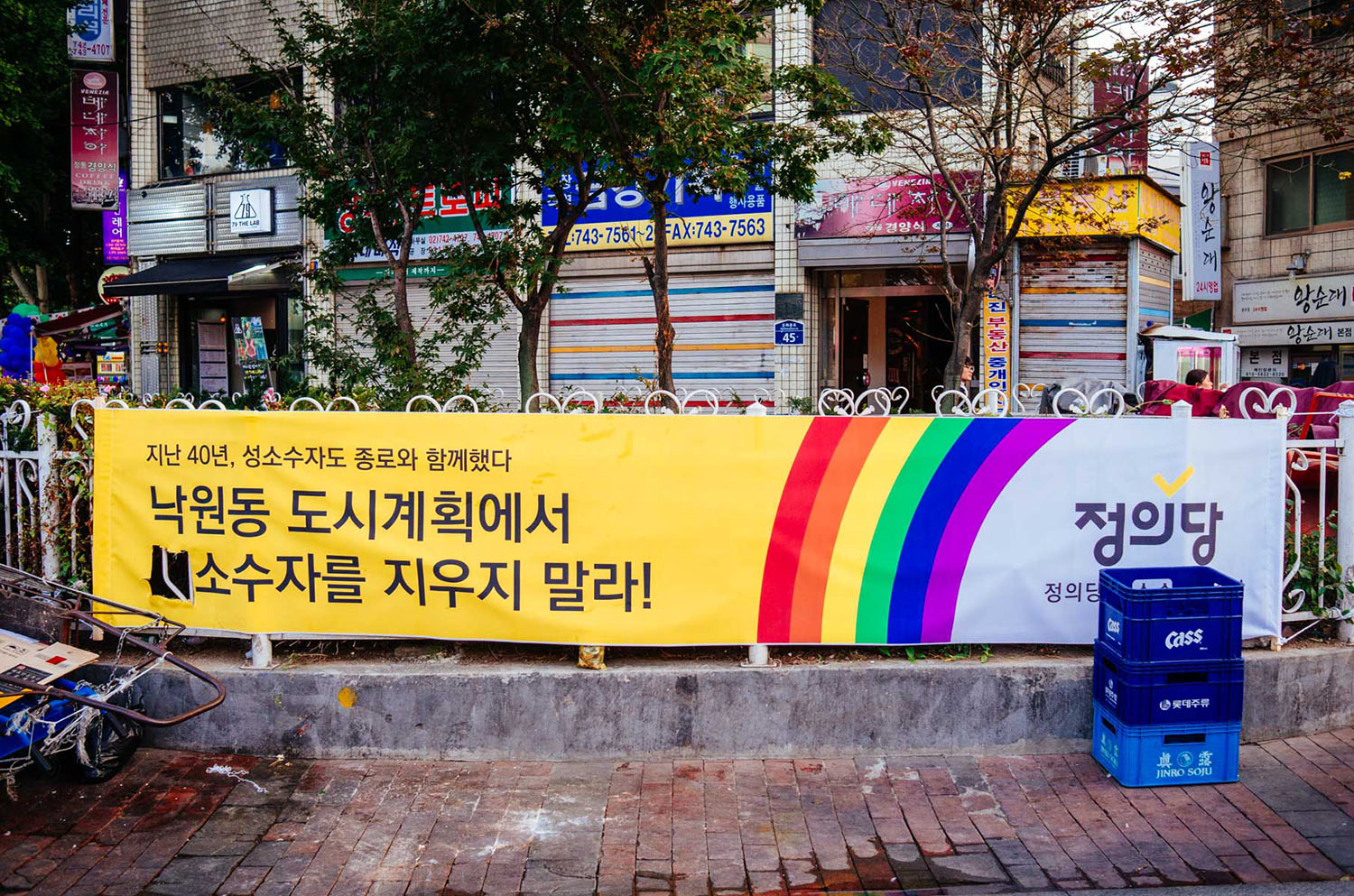
▲ 2017.10.14. @돈화문로11길
History of the Gay Community in Jongno 3-ga
Kim, Daehyun(Korean Gay Men’s Human Rights Group Chingusai (“Between Friends”), Steering Committee Member
/ The Institute for Korean Historical Studies, Research Fellow)
1. Pagoda Park
Pagoda Park is the first modern park built by Koreans in 1897. The park's name comes from the Ten-story stone pagoda at Wongaksa Temple Site, which is located in the park and is designated as National Treasure No. 2. After the Korean Empire was forcibly annexed by Japan in 1910, the March 1st Movement, a national resistance against Japanese rule, erupted in 1919, and the Declaration of Independence was read at this site. After the founding of the Republic of Korea, the statue of President Syngman Rhee erected in Pagoda Park was removed on April 26, the day of his resignation following the April 19 Revolution of 1960. In this way, Pagoda Park has become a place that symbolizes national identity throughout Korea's modern and contemporary history.
Meanwhile, the area has also served as a gathering place for people who engaged in non-normative gender and sexual practices, corresponding to today's LGBTQ+ community. They often compared themselves to Bae Jeong-ja, a famous pro-Japanese woman during the Japanese colonial period, revealing their sense of being outside the nation's normative subject. In the past, sexual minorities would linger around the tower in Pagoda Park in search of a one-night stand, a practice known as "tapdori" (meaning "people circling around the tower"), a behavior modeled on that of street sex workers who also existed in the area. In fact, the area around Jongno 3-ga was a famous red-light district in Seoul. In the past, gay and transgender women and sex workers shared similar forms of social stigma. That is, they were stigmatized as non-normative beings who seemed incapable of having sex within the normal nuclear family.
One of the terms gay and transgender women use to refer to themselves is "bogal". This term is a reversal of "galbo," a derogatory term for sex workers. The similarity between these two words is not accidental, as we saw earlier. Even today, gay men in South Korea sometimes use the phrase "I wasn't sold (to any men) today." while sitting in gay bars. This phrase carries the implicit meaning of comparing oneself to a sex worker. The fact that such language is rarely used by heterosexual men reveals the structural difference between heterosexuality and non-heterosexuality, while also revealing how gay and transgender people have performed a form of non-normative femininity that is metaphorically similar to that of sex workers. A Korean film that effectively captures this context is E J-yong's The Bacchus Lady (2016).
In the 1990s, the LGBTQ+ rights movement began to gain visibility in South Korea. The first protest organized solely by LGBTQ+ rights groups took place at the main entrance of Pagoda Park. The protest, which challenged homophobic language in school textbooks, took place on June 28, 1997. During the era of government-issued textbooks, a high school ethics textbook stated, "The spread of AIDS, same-sex relationships, prostitution, sexual assault, drugs, obscene videos, and low-quality comic books are leading to moral decay in society. A high school military drill(敎鍊) textbook directly linked "same-sex relationships" and AIDS. In addition, the Seoul Metropolitan Office of Education published a textbook entitled "Sex and Happiness," which includes terms such as "unhealthy sexual culture in relation to prostitution or same-sex sexual relations. The protest was organized by Chingusai, the gay men rights group founded in 1994, and other activist groups, who marched with signs reading "Revise the discriminatory textbooks against homosexuals" and holding candles.
2. Pagoda Theater
Named after Pagoda Park, the Pagoda Theater was built here in 1960. As time passed and the 1970s arrived, it became a double feature theater with outdated facilities, and today it has been transformed into a place where gay and transgender women gather to find sex partners and have sex. The Pagoda Theater played a central role in establishing the infrastructure for gay establishments in Jongno-3ga after the 1970s. It was covertly referred to as "P Theater" or "P Salon" in contemporary popular entertainment magazines and served as a hub for individuals who practiced non-normative gender and sexuality. The theater was finally closed in 2002. A Korean film that vividly captures the history of this space is Minki HONG's Paradise (2023).
Sex in this space was sometimes the subject of police raids, but at other times it took place under police protection. Not only here, but during the military dictatorship, most entertainment venues in Jongno 3-ga operated under the private protection and collusion of the police or organized crime groups.
3. Nakwon ("Paradise") Shopping Center
Nakwon Shopping Center is Korea's largest musical instrument specialty market. In 1967, the Nakwon Shopping Center building and the Pagoda Arcade were constructed around Pagoda Park, and musical instrument specialty stores began to open in the Pagoda Arcade. In 1979, the Pagoda Arcade was demolished, and the stores moved to Nakwon Shopping Center in the 1980s, where they remain today.
The reason for the thriving musical instrument market here was that the service workers who entertained customers at entertainment venues at that time were mainly band musicians. In fact, these entertainment venues served as a cradle for the growth of Korean K-POP, with the most representative example being the Eighth United States Army (EUSA) R&R (Rest & Recreation) Stage, also known as the "Comfort" Stage. Beginning in the 1950s, entertainment venues for U.S. military personnel flourished around U.S. military bases, and their stages featured trained professional musicians, singers, and dancers. The companies that trained these performers are the forerunners of today's K-pop entertainment agencies and apprenticeship systems. A Korean documentary that vividly captures this era is Daehyun Kim's Try to Remember (2015).
Lee Baek-cheon, who was a concert organizer for acoustic guitar singers who performed at the "Comfort" stage and popular music listening rooms such as "C'est Si Bon" and "Tree Frog's House," recalled the situation at that time as follows: "While I couldn't even visit my own family for the U.S. military's morale-boosting performances, I had to comfort U.S. soldiers from both the South and the North with their music." The transnational sex trafficking network surrounding Korea is still active today. Currently, cases of women from Southeast Asia entering the South Korean sex industry on "entertainer visas (E-6)" are on the rise. A South Korean documentary that addresses this issue is Host Nation (2016), directed by Goun Lee.
4. Friends
There is another connection between the Paradise Shopping Center and gay bars. Beginning in the 1980s, as the popularity of entertainment venues shifted from bands to karaoke, the space for the musicians who used to fill the venues began to shrink, resulting in the emptying of music instrument warehouses in the area. Music warehouses were generally cheap to rent, and gay bars began to pop up in their empty spaces, which were often underground and perfect for establishments that didn't want their customers to know who they were. In addition, late night business was illegal in South Korea until 1999, so most of the country's adult entertainment industry, including gay bars, kept their doors locked and operated illegally after midnight.
Friends, a gay bar, opened in 2003 and moved to its current location in 2004. What makes Friends unique is that it was the first gay bar in Jongno 3-ga to be located on the first floor and to fly a rainbow flag. When it first opened, there were many complaints from customers about its ground-floor location and rainbow flag. It took some twists and turns before the gay bar was moved to the ground floor with glass windows to see inside. In addition, due to the peculiarities of South Korea's business culture and legal system, it is extremely rare for a business to remain in the same location for an extended period of time without moving for profit. For this reason, Friends cannot be considered solely as a for-profit commercial space.
5. Ojinam(梧珍庵)
The current location of the ibis Ambassador Seoul Insadong Hotel was once the site of Ojinam, which operated from 1953. Ojinam, where gisaeng (妓生, lower-class women from outcast or enslaved families who were trained as courtesans to provide artistic and sexual entertainment and conversation for upper-class men) dressed in hanbok actually served alcohol, served as a behind-the-scenes political center during the Park Chung-hee regime in the 1960s and 1970s. It was also where the draft of the July 4 North-South Joint Declaration was finalized in 1972 with North Korean officials visiting the South. In addition to this location, several other famous brothels operated in Jongno 3-ga, and after the diplomatic normalization between South Korea and Japan in 1965, these establishments thrived on the influx of Japanese tourists, enjoying what was known as the "Japanese sex tourism (妓生觀光)" boom. Some of the buildings that once stood here have been moved to Mugeonwon (武溪園) in Buam-dong, Jongno-gu, and are now advertised as the former residence of Prince Anpyeong.
These brothels(料亭) had stages where gisaeng performed their arts. Under South Korea's entertainment industry regulations, only "yuheoungjujeom(遊興酒店)," with a Type 1 entertainment license, were allowed to have stages. These entertainment establishments legally designated entertainment venues include room salons and nightclubs, which can legally employ entertainment staff, while other Type 2 venues, such as danlanjujeom (團欒酒店, karaoke where alcohol is permitted) and Type 3 regular karaoke (노래연습장), are not allowed to install stages. This tradition of strictly classifying entertainment venues based on the presence of stages and performances dates back to 1908. The "Yegi(藝妓, Gisaeng engaged in performing arts) Regulation Order" and the "Changgi(娼妓, full-time prostitute) Regulation Order" enacted that year separated "Type 1 Restaurant" where "Yegi" performed on stage from "Type 2 Restaurant" where "changgi" was employed. The desire to separate drinking, singing and prostitution was shared by both the Japanese colonial government and the Gisaeng Association, but unfortunately the two were often not separated.
With the national liberation of Korea in 1945, the Japanese colonial system of public prostitution was abolished, but only "changgi" was abolished, while the regulations on "yegi" remained in the "entertainment workers(遊興接客員)" clause of the Food Sanitation Law(食品衛生法) and continue to exist in the legal text to this day. Similarly, the legal distinction between "entertainment workers" and prostitutes has often failed to hold, despite efforts to separate the two. This is the tragic story of a century-long entanglement between the "stage" and the "tantara" (derogatory term for musicians or performing artists).
6. Hole, Shim
At 93 Ikseon-dong, Jongno-gu, a gay karaoke bar called "Hole" is currently in operation. The fact that smoking is allowed inside suggests that this is the Danlanjujeom, which has a Type 2 entertainment license. This is also the place where men dressed as women who worked there were arrested by the Seoul Jongno Police Station in 1983 and handed over for summary trial(卽決審判). Not only the cross-dressing men arrested for violating the Minor Crimes Punishment Law (輕犯罪處罰法), but also sex workers at the time were arrested by the police, summarily tried, and detained for up to 29 days.
This reflects a characteristic of queer-related crackdowns in South Korea. Unlike the United States, where sodomy laws under the general criminal code prohibited gay/queer behavior, and South Korea, which adopted similar provisions in its military penal code, South Korea relied primarily on the Minor Offenses Punishment Act and other laws targeting "demoralizing behavior and public indecency(風紀紊亂)" to punish queer individuals, sex workers, and other marginalized groups. Police raided gay bars and arrested only cross-dressing men, as there was little justification for arresting gay patrons whose gender nonconformity was not immediately apparent unless it was a late-night business raid.
In 1974, the area's first gay bar, "Shim," opened in Gwonnong-dong, near Changdeokgung Palace. Following the normalization of diplomatic relations between South Korea and Japan in 1965, the bar was frequented by Japanese tourists, including gay and transgender women, who financed the establishment. "Galdeung" opened in 1978, followed by "Gal" in 1979. At Shim, older Japanese gay men would come and be served by younger Korean gay men, reminiscent of "Japanese sex tourism" targeting heterosexual sex workers. The connection between the empire's sex buyers and the sex industry of a post-colonial, underdeveloped country was persistent, and queer people's dwellings were right there.
Mainstream club culture, which had centered on underground nightclubs in hotels aimed at earning foreign exchange by attracting U.S. military personnel on R&R, shifted to indie clubs in Hongdae in the 1990s (the two clubs were governed by different legal regulations). As a result, the entertainment culture there relatively escaped the grip of prostitution, which was actually practiced and procured in the same places. At the same time, it took a long time for the term "selling" to shift from literal to metaphorical prostitution, as gay/queer people in the gay bar used to say, "I wasn't sold (to any men) today". Efforts have been made to create a culture of sexual consent within entertainment and to redefine the norms and non-norms of obscenity, promiscuity, and pleasure from the perspective of "us" rather than "them".
7. Donkwang and Chingusai Office
The Donui-dong dosshouse town(쪽방촌) is a place where poor people live. In the past, some of the rooms there were used as "donkwang," where gay men gathered to have sex. It is common for heterosexual spaces to be transformed into homosexual spaces by the homosexuals who frequent them. A representative example of this was the gay sauna, or "jjimbang," which appeared in the 1990s.
The office of the Korean Gay Men's Human Rights Group Chingusai, is located in an area where such establishments are concentrated. Founded in 1994, Chingusai moved its office to Jongno 3-ga in 1998 and has been located here since 2006. Chingusai chose Jongno 3-ga as its office location because it believed that an organization working with the gay community should be located where the existing gay community is.
Chingusai is not only interested in the existing gay community, but also in the gay community that will be created in the future. The Chingusai office is a place where meetings of many organizations affiliated with Chingusai are held on a regular basis. Chingusai and other LGBTQ+ rights movements in Korea have been closely allied with the labor movement, the human rights movement, the women's movement, and the disability movement in Korea. A Korean film that reflects this history is Lee Dongha's Weekends (2016).
For example, during the activities of the Anti-Discrimination Law Coalition in May and June 2022, which called for the enactment of an anti-discrimination law, one of the two activists in the coalition who went on a hunger strike for several days was a gay activist affiliated with Friends. This is one of the monumental events that highlights the history and status of the gay rights movement and the gay community in Korea.
In May 2020, during the Itaewon COVID-19 pandemic, Na Young, an activist from SHARE, center for Sexual rigHts And Reproductive JusticE, one of the organizations affiliated with Chingusai, made the following statement at a press conference on May 29. This was possible because gay people and other groups, despite their different identities, came together through various social movements in Korean society, recognized each other, and fought together to achieve common goals. The memory of "having-been-together" is sometimes more powerful than identity politics. Chingusai has never forgot this fact.
"[About articles on gay saunas]Having lived my whole life surrounded by violent and sensational news about heterosexual relationships, I couldn't understand what was so shocking or sensational about it. In fact, the part where they said, "If you like someone, touch them, and if they respond, you have a relationship; if they refuse, go to another room," made me think it was fortunate that they were at least confirming consent. "There was a break room set up on one side of the hallway. It looked like a regular break room with a TV, a soda machine, and an ashtray. That was before I noticed the basket of condoms and lubricant next to the entrance." I was relieved to see that they were properly stocked with sexual health supplies. A basket of condoms and lubricant - how precious!
As we witness the case of sexual exploitation in Telegram, we clearly see the consequences of a society that has prioritized obscenity over violence. [When it comes to the rights of sexual minorities and our sexual rights, we are not concerned with where, with whom, how many or how sexual relations take place. Instead, we focus on ensuring that consent, respect, anti-discrimination, anti-violence, and appropriate methods for maintaining sexual health are also emphasized in sexual relations among sexual minorities."
-
* This field trip manuscript was prepared at the request of the Department of Political Science at the University of Colorado Denver for the Korean Gay Men's Human Rights Group Chingusai as a guide and lecturer for a field trip to Jongno 3-ga. The original Korean version includes footnotes citing sources for each piece of information. Unauthorized use and reproduction are prohibited. If you have any questions about this manuscript, please contact the Chingusai Office.
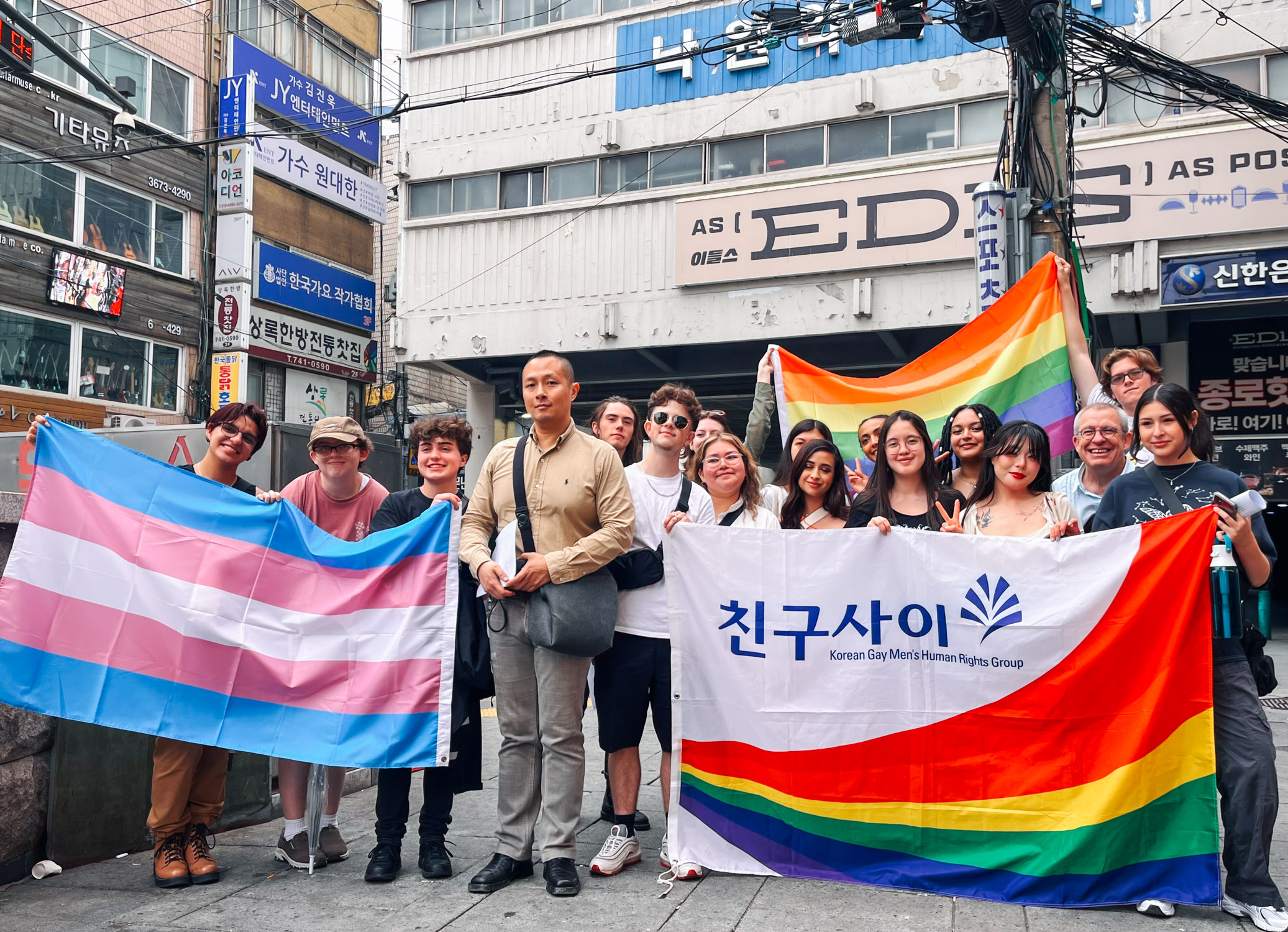
▲ 2024.5.26. @낙원상가
(2025.5.24. 개정·증보)



